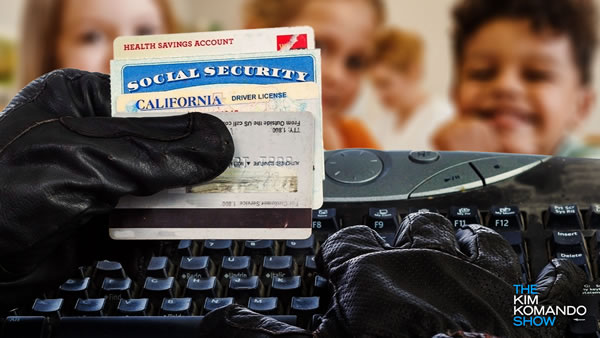(From Kim Komando newsletter 4/22/2024)

Last year, a Hawaii couple was convicted of living for decades under the identities of dead babies. Stories like this always disgust me, but after this long in tech, they don’t surprise me.
Crooks have no shame, folks: 2% of identity theft cases reported to the Federal Trade Commission (FTC) last year involved the personal info of Americans age 19 or younger. Many more go unreported, partly because they aren’t discovered until the victim attempts to apply for their first loan or credit card.
Once thieves get your kid’s Social Security number, they only need basic info found easily online, like their address, name and date of birth, to take out a loan or line of credit in their name.
Worse, you might be making these common mistakes that put your kid’s credit at risk — and you won’t realize it until it’s way too late.
Identity swiper, no swiping!
Here’s how to keep thieves from stealing your kid’s data.
Step 1: Freeze your kid’s credit
- Check their credit report (instructions here).
- No one should have a credit report until they’re an adult, so no credit report is good news! If there is one, you know there’s a problem.
- Ask the credit agencies to freeze your child’s credit. Do this as soon as you get their Social Security number.
- Going forward, monitor their credit report just like you monitor your own. Go to annualcreditreport.com and sign up for alerts. You can read my full advice here.
Step 2: Protect their info
- Be skeptical: Identity thieves can be anyone from a relative, someone collecting payments at the doctor’s office or even a soccer coach. Be wary about handing over your kid’s SSN.
- Lock it up: Put physical SSN cards and birth certificates in a fireproof document box and lock down digital copies with multifactor authentication or passwords.
- Be social-savvy: Be careful about posting key identifying info related to your kid, like their birth date or physical address. No more pics of driving permits, either, OK?
Step 3: Show your kid the ropes
Gen Alpha, kids age 14 and younger, may be growing up with the internet, but that doesn’t mean they have adult judgment. Warn them of these common traps:
- “Personality” quizzes that are fronts for data miners.
- Questions from strangers on social media or video game chats.
- Phishing emails; most kids have email addresses by the time they’re in their teens.
- Handing over any info to curious strangers online.

